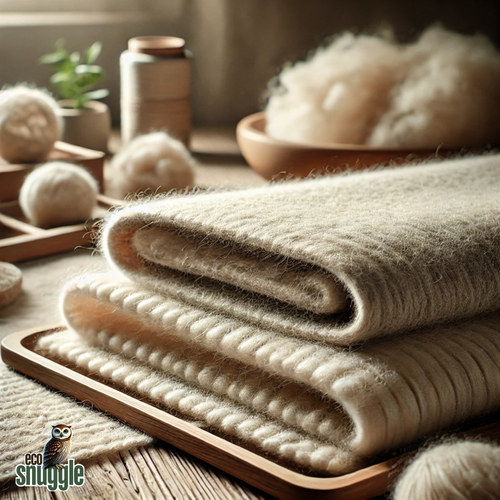
Felt - a sustainable choice or an environmental risk?
Felt is a versatile material widely used in fashion, interior design, and industry. However, not all felt is created equal, especially when considering its impact on the environment. In this article, we explore the different types of felt, their composition, and decomposition properties to help you make informed and eco-friendly choices.
What is Felt?
Felt is a non-woven textile material made by compressing and pressing fibers together. It can be produced from both natural and synthetic fibers, which largely determines its environmental impact.
Environmental Impact of Different Types of Felt:
-Natural Wool Felt
Composition: 100% animal-derived wool, such as sheep wool.
Decomposition: Fully biodegradable and compostable, breaking down naturally without leaving harmful residues.
Environmental Impact: If the wool comes from ethically raised animals and the production process is environmentally friendly, it’s an excellent choice. This material is ideal for those who wish to protect the environment while supporting sustainable production.
-Synthetic Felt
Composition: Polyester, nylon, or other petroleum-based fibers.
Decomposition: Not biodegradable; can persist in nature for decades, breaking down into microplastics that pollute the environment.
Environmental Impact: Production and decomposition significantly harm the environment. If sustainability is the goal, synthetic felt should be avoided.
-Recycled Felt (RPET)
Composition: Made from recycled plastic bottles (RPET) or other recycled materials.
Decomposition: While recycling reduces the need for new plastic production, this material is not biodegradable and may eventually contribute to microplastic pollution.
Environmental Impact: Though recycling is a step in the right direction, RPET felt does not align with Eco Snuggle’s values, as we prioritize materials that decompose naturally and safely.
What Should You Ask Before Making a Choice?
If you are considering purchasing or ordering a felt product, always ask:
- Is it natural wool felt?
- Is it synthetic felt?
- Is it made from recycled materials?
This awareness will help you make a better choice, not only in terms of product quality but also its environmental impact.
Eco Snuggle is committed to offering only materials that align with our sustainability principles. Currently, we do not offer felt products, as we have not yet found high-quality natural wool felt that meets our standards. Natural felt is undoubtedly the best choice for those who wish to contribute to environmental preservation. By choosing natural wool felt, you not only enhance your brand’s product line but also protect the planet. When choosing felt, it’s important to consider its composition and environmental impact. By opting for natural wool felt, you can be confident that your choice is kind to both nature and people. Be informed, research before making a purchase, and choose wisely – because every decision matters!
